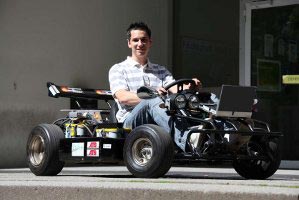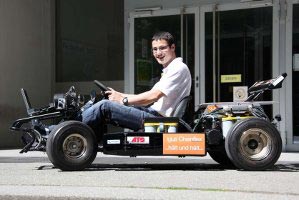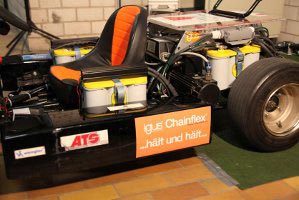“E-Kart” project
Maximum driving fun thanks to 230 NmThe “E-Kart” project kicked off in October 2007 with the basic idea of converting a street-legal kart with a combustion engine into an electric kart with maximum driving pleasure. This project is looked after at Karlsruhe College for Technology and Business by Professor J. Walter in the Department of Mechanical Engineering and Mechatronics.
Since the initiation of the project, student teams continually work for further development each semester. Starting with the retrofit and the rebuilding of the "E-Kart" with electric motors, the development of a traction control system (TCS), a concept for the shell of the "E-Kart", the optimization of the brakes, the construction of a camera mounting bracket on the "E-Kart", up to the MOT approval team. This means that till the beginning of 2009, seven student teams of the disciplines mechanical engineering, vehicle engineering and mechatronics carry out lecture-related projects on the "E-Kart".

While the application for MOT approval as research vehicle is still being processed, in March 2009 two additional student teams from the mechatronics department started new projects on the "E-Kart" in the summer semester.
The students Mario Herbold and David Schiebol developed a system for the recovery of brake energy. Like in hybrid vehicles, electric energy should thereby be re-fed to the batteries during braking. This not only spares the brake system through the operation of the drive motor in generator mode, but the potential drive time is also prolonged. This guarantees a longer driving fun at 230Nm torque.
The students Nino Kovac and Tilman Dilger also study mechatronics and pursue a widely structured project. First the built-in starter batteries had to be replaced, as their capability had diminished significantly. Thus a new battery technology had to be integrated. Second a concept for the rapid charging of the four traction batteries with 4x25 ampere could be implemented due to special AGM batteries, so that with regard to the temperature, the charging of the "E-Kart" is completed after two hours. The third important part of the project was the integration of the measurement system in the "E-Kart". In this way the measurements of the four battery voltages and of the power of the series-connected batteries should be recorded. To save and directly issue the measured values to the driver, a netbook was installed on the "E-Kart".

Due to the newly integrated batteries, the increased power of the chargers and the maximum currents during recuperation of up to 100 ampere, the power routing had to be built up from scratch. In addition the feeder lines to the chargers as well as the complete cabling of the measurement technology had to be built. It doesn't matter if the cable diameter is 35 or 10 sq mm, control or data cables, everything needed to be in top quality and in shielded design. igus® generously sponsored this project and we want to express our cordial gratitude.
But the development of the "E-Kart" is far from over. Due to the measurement technology, new findings on the batteries and the behavior during the recuperation phases were obtained. A scheduled milestone also constitutes the integration of wheel hub motors in the "E-Kart".
